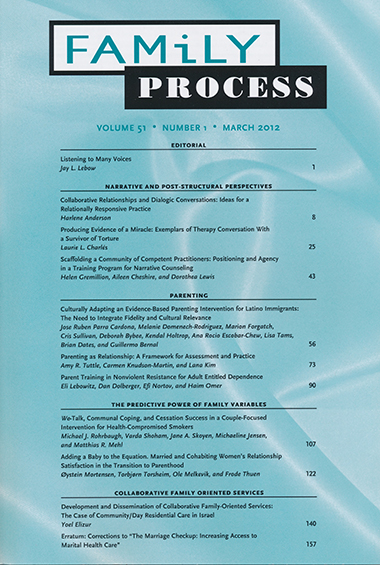
Nachdem Evan Imber-Black von 2004 bis 2012 als Herausgeberin die Geschicke der Family Process gesteuert hat, hat sie nun das Herausgeber-Szepter an Jay L. Lebow übergeben. Lebow ist Professor für klinische Psychologie an der Northwestern University in Evanston, Illinois (nördlich von Chicago) und hat eine Reihe klinischer Lehrbücher verfasst, die in Deutschland allerdings nicht so bekannt sein dürften wie die Bücher seiner Vorgängerin, von denen die meisten bei Carl Auer auf Deutsch erhältlich sind. In seinem ersten Editorial für Family Process verspricht Lebow, mit der Zeitschrift Gegenakzente gegen die zunehmende Tendenz zur Medikalisierung komplexer Lebensprobleme zu setzen und reduktionistischen Versuchen rein neurologischer Erklärungen und pharmakologischer Lösungen zu widerstehen:„The great task to my mind for this and the next generation of family therapists and family scientists is to elaborate and agree about what constitute the core pillars of knowledge about families, the core methods of practice, the common elements that transcend all methods of practice, and the adaptations needed with these methods in different contexts (most especially, different cultures), and how to train students in these skills. Some bemoan this as a less exciting time in the field; that’s, I think, in the eye of the observer. If you are innately a pioneer, you may want to move to some new endeavor; but for most of us I think this a very important time for what more than ever is a vitally important field of endeavor. We possess a truth, the vital importance of relational systems, still largely ignored by many in the mental health field, in social science, and among policy makers. Further, there have recently arisen new constraints to the dissemination of this understanding and programs based on itmost especially the decreasing budgets available for programs and the recent reemergence of the medical model of mental health, neurological explanation, and psychopharmacological solutions to complex human issues in living. I don’t see any need at this point to save us from respectability in the way that Jay Haley (1969) warned about in his final essay as editor of Family Process, assuming respectability means a profession that establishes a body of what is known, practices its best methods, interfaces with other related disciplines, and is highly regarded. I might add that we do need, with Haley, to remain aware of the risks that come with the temptations of such respectability. We must honor the core of family systems theory on which our work is based and beware the enticements that move us away from a focus on the family system, be they the lure of more easily available grant money about individual or biological aspects of problems in a society that undervalues family research, or the stresses and strains on the family therapist in terms of reimbursement and the need to practice at inconvenient hours to see families in today’s world“ Dass Lebow dies gelingen möge, ist zu hoffen.
Zu den vollständigen abstracts des ersten Heftes 2012

